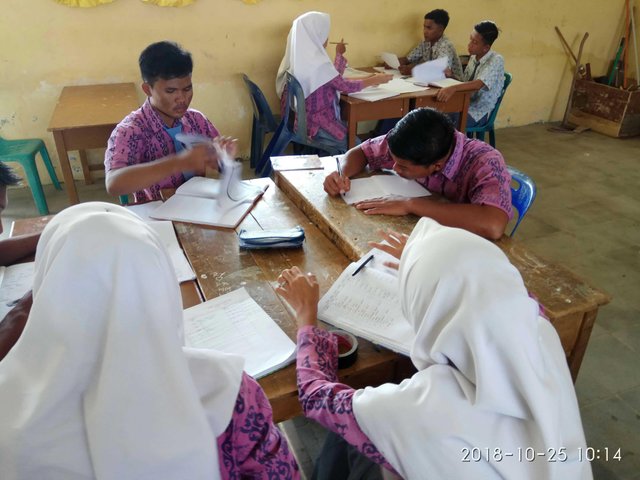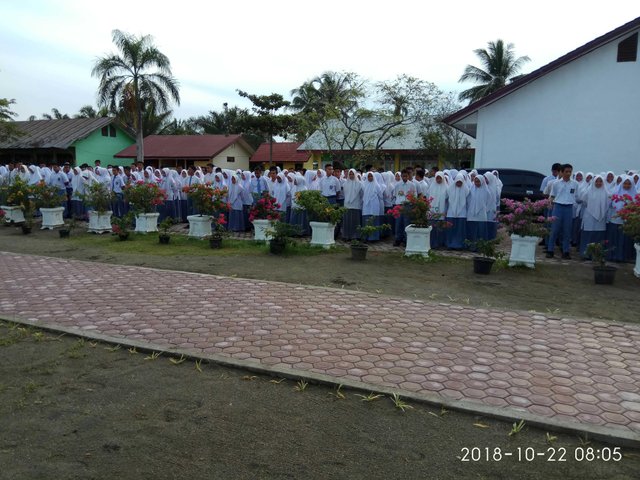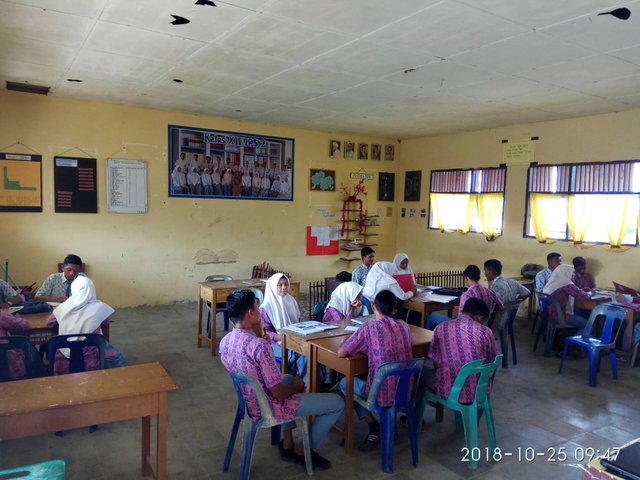Learn for change
Learning is one of the factors that influence and play an important role in personal formation and individual behavior. Nana Syaodih Sukmadinata (2005) states that most of the individual development takes place through learning activities. So, what exactly is learning?
Below is conveyed about the understanding of learning from experts:
Moh. Surya (1997): "learning can be interpreted as a process carried out by individuals to obtain new behavioral changes as a whole, as a result of the individual's own experience in interacting with his environment".
Witherington (1952): "learning is a change in personality manifested as new response patterns in the form of skills, attitudes, habits, knowledge and skills".
Crow & Crow and (1958): "learning is getting new habits, knowledge and attitudes".
Hilgard (1962): "learning is a process where a behavior appears behavior arises or changes because of a response to a situation"
In Vesta and Thompson (1970): "learning is a behavior change that is relatively settled as a result of experience".
Gage & Berliner: "learning is a process of behavior change that arises because of experience"

From some of the understanding of learning above, the key word of learning is behavior change. In this case, Moh Surya (1997) suggests characteristics of behavior change, namely:
- Change that is conscious and intentional (intentional).
The behavior change that occurs is a conscious and intentional effort of the individual concerned. Likewise with the results, the individual concerned realizes that in him there has been a change, for example his knowledge is increasing or his skills are increasing, compared to before he followed a learning process. For example, a student is learning about educational psychology. He realized that he was trying to learn about Educational Psychology. Likewise, after studying Educational Psychology he realized that in him there had been a change in behavior, by gaining a number of knowledge, attitudes and skills related to Educational Psychology.
- Continuous change (continuous).
The increase in knowledge or skills possessed is basically a continuation of the knowledge and skills previously obtained. Likewise, the knowledge, attitudes and skills that have been obtained, will be the basis for developing the next knowledge, attitudes and skills. For example, a student has studied Educational Psychology about "The Nature of Learning". When he participates in the "Teaching and Learning Strategies" lecture, his knowledge, attitudes and skills about "The Nature of Learning" will be continued and can be utilized in attending the "Teaching and Learning Strategies".

- Functional changes.
Every behavior change that occurs can be utilized for the life of the individual concerned, both for the sake of the present and in the future. Example: a student learns about the psychology of education, so his knowledge and skills in the psychology of education can be used to learn and develop his own behavior and learn and develop the behavior of his students later when he becomes a teacher.
- Positive changes.
The behavioral changes that occur are normative and show progress. For example, a student before learning about Educational Psychology considers that in the Teaching and Learning Process does not need to consider individual differences or behavioral and personal development of students, but after attending the Educational Psychology study, he understands and wishes to apply the principles of individual differences and the principles of individual development if he later becomes a teacher.
- Changes that are active.
To obtain new behavior, the individual concerned is actively trying to make changes. For example, students want to gain new knowledge about the psychology of education, so students are active in reading and studying educational psychology books, discussing with friends about educational psychology and so on.
- Harvesting changes.
Behavior changes obtained from the learning process tend to settle down and become an inherent part of him. For example, students learn to operate a computer, so mastering the skills to operate the computer will be permanent and inherent in the student.
- Changes that are intended and directed.
Individuals doing learning activities must have goals to be achieved, both short-term, medium-term and long-term goals. For example, a student studying educational psychology, the goal to be achieved in a short length of time may be that he wants to acquire knowledge, attitudes and skills about the psychology of education that is realized in the form of graduation by obtaining an A value. adequate education psychology. Various activities are carried out and directed towards achieving these goals.
- Changes in overall behavior.
Changes in learning behavior are not just about gaining knowledge, but include getting changes in their attitudes and skills. For example, students learn about "Learning Theories", besides getting information or knowledge about "Learning Theories", he also gets an attitude about the importance of a teacher mastering "Learning Theories". Likewise, he acquired skills in applying "Learning Theories".

According to Gagne (Abin Syamsuddin Makmun, 2003), behavior changes that are learning outcomes can take the form of:
Verbal information; namely mastery of information in verbal form, both in writing and writing, for example giving names to objects, definitions, and so on.
Intellectual skills; that is individual skills in interacting with their environment by using symbols, for example: the use of mathematical symbols. Included in intellectual skills are skills in discrimination, understanding concrete concepts, abstract concepts, rules and laws. These skills are very much needed in dealing with problem solving.
Cognitive strategies; individual skills to control and manage the overall activity. In the context of the learning process, cognitive strategies are the ability to control memories and ways of thinking for effective activities to occur. Intellectual skills focus on learning outcomes, while cognitive strategies place more emphasis on the thought process.
Attitude; namely learning outcomes in the form of individual skills to choose the type of action to be performed. In other words. Attitude is a state in an individual who will give a tendency to act in the face of an object or event, in which there are elements of thought, feelings that accompany thinking and readiness to act.

Motor skills; learning outcomes in the form of movement skills that are controlled by muscles and physically.
Meanwhile, Moh. Surya (1997) suggests that learning outcomes will appear in:
Habits; such as: students learn languages repeatedly avoiding the tendency to use words or structures that are wrong, so that eventually he gets used to the use of language properly and correctly.
Skills; such as: writing and exercising which, despite their motor skills, require careful coordination of movement and high awareness.
Observation; namely the process of receiving, interpreting, and giving meaning to stimuli that enter through the senses objectively so that students are able to achieve the correct understanding.
Associative thinking; namely thinking by associating something with others using memory.
Rational and critical thinking that is using the principles and basics of understanding in answering critical questions such as "how" (how) and "why" (why).
Attitude is a relatively sedentary tendency to react in good or bad ways to certain people or goods according to their knowledge and beliefs.
Inhibition (avoiding redundant things).
Appreciation (appreciating quality works.
Affective behavior is the behavior concerned with feelings of fear, anger, sadness, joy, disappointment, pleasure, hatred, anxiety and so on.
Get that panyang lagou, bahasa inggris laen tabaca laen ta tuleh.
Posted using Partiko Android
Thanks for using eSteem!
Your post has been voted as a part of eSteem encouragement program. Keep up the good work! Install Android, iOS Mobile app or Windows, Mac, Linux Surfer app, if you haven't already!
Learn more: https://esteem.app
Join our discord: https://discord.gg/8eHupPq
Hello @bustamam! This is a friendly reminder that a Partiko user has just followed you! Congratulations!
To get realtime push notification on your phone about new followers in the future, download and login Partiko using the link below. You will also get 3000 Partiko Points for free, and Partiko Points can be converted into Steem token!
https://partiko.app/referral/partiko
Congratulations @bustamam! You received a personal award!
You can view your badges on your Steem Board and compare to others on the Steem Ranking
Vote for @Steemitboard as a witness to get one more award and increased upvotes!